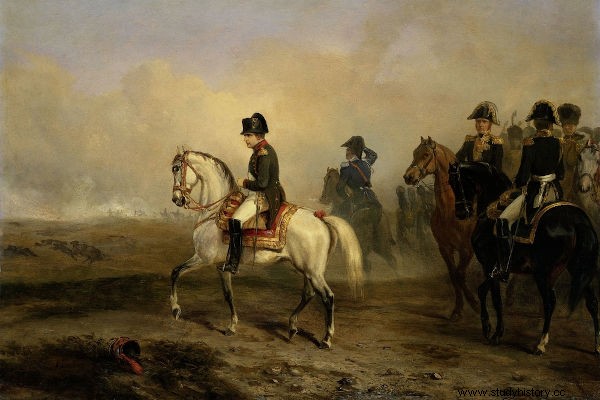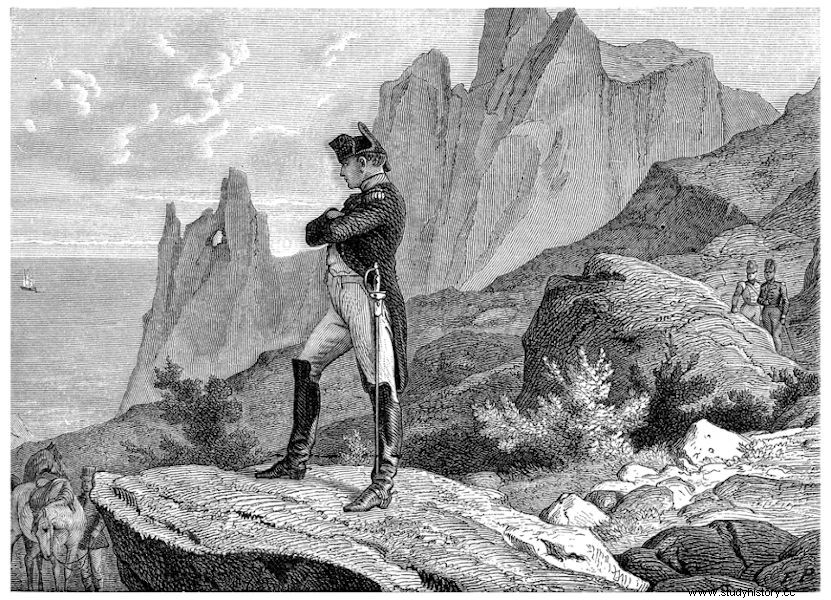Napoleon Bonaparte was a French soldier who saw his career rise meteorically due to his military deeds against his country's enemies during the French Revolution. He became an important personality in France and came to power through a coup known as the 18th Brumaire Coup.
How ruler of France, Napoleon was first consul, consul for life, and emperor. He expanded the French borders and fought a long and hard war against the English. Weakened after his failure in Russia, Napoleon was definitively defeated at Waterloo and died in exile on the island of Saint Helena.
Login also :Do you know the story of Napoleon's mistresses?
Napoleon Bonaparte's birth and youth

Napoleon Bonaparte born in the city of Ajaccio , located on the island of Corsica, on August 15, 1769 . Napoleon's father was a lawyer named Carlo Maria Bonaparte, and his mother was named Maria Letícia Ramolino. Napoleon's parents were descendants of noble families in Italy (the island of Corsica belonged to Italy until the year 1768). Napoleon had nine siblings (two died in infancy)
The Italian origins of Napoleon's family caused his name, at first, to be spelled as Napoleone di Buonaparte . To facilitate his assimilation into French society, years later, Napoleon adopted the French form of writing:Napoleón Bonaparte .
The social position of Napoleon's family allowed him to have access to a good education , being initially enrolled in a religious school and later having entered a military college in Brienne-le-Château. In 1784, he entered the Military School of Paris and there he had to finish his studies in a year because of the death of his father.
Napoleon Bonaparte's military career
Shortly after graduating from the Military School in Paris, Napoleon received the rank of second lieutenant and was assigned to a regiment in northern France. Before the start of the French Revolution, he was still assigned to two different regiments. In fact, until 1792, Napoleon was on and off the island of Corsica because he was involved in revolutionary affairs there.
The issues in which Napoleon was involved had to do with the revolutionary movement in Corsica, which wanted autonomy and less control of the French government on the island. With the revolution, Napoleon was promoted to captain in 1792 and began to express favorable positions to the Jacobins, one of the groups that led the revolution in the country.
As late as 1792, Napoleon approached Augustin Robespierre, brother of Maximilien Robespierre, the leader of the Jacobins. The following year, 1793, Napoleon managed to be appointed as commander of the artillery of a battalion that attacked Toulon , a city that had rebelled against Robespierre's rule.
Napoleon led this attack and was very successful in conquering the city, making his name well regarded by the Jacobins in general. He even secured a promotion to brigadier general and was appointed to command the artillery of a battalion that was in Italy. Napoleon even had a small part in the battles against the First Coalition.
In 1794, the Thermidorian Reaction , a coup carried out by the Girondins against the Jacobins. The Girondins rebelled, seized power in France and turned against the Jacobin leadership in revenge for the persecution practiced during the Terror. Napoleon's proximity to the Jacobins caused him to be imprisoned in Nice .
Napoleon's imprisonment was short lived and two weeks later he was released. The reason behind this is that Napoleon's military skills were too valuable for France at that time. Napoleon was asked to plan an attack in the war waged against the Austrians. In late 1795, his situation was turned around by events in Paris.
In October 1795, a revolt of royalists broke out in Paris, and one of the most prominent Girondins, Paul Barras, invited Napoleon to lead the troops protecting the Tuileries Palace. Napoleon was responsible for controlling the monarchist revolt , killing thousands of them and ensuring the stability and security of the Convention.
Napoleongained prestige after that, he won a promotion, becoming commander of the Army of the Interior, and came to command a troop that was installed in Italy. The new positions allowed Napoleon access to important political issues.
Login also :Paris Commune – first experience of proletarian government in history
Napoleon Bonaparte's rise to power

In 1796, the rise of Napoleon Bonaparte was meteoric. The Frenchman's military achievements allowed him to become apersonality known throughout France and was considered by many to govern the nation.
That same year, he took over the Army of Italy , a French troop installed in the Italian Peninsula, and turned it into a great force, causing this army to win many victories in battles against Austrian troops. Napoleon's victories against Austria forced the First Coalition leadership to seek to negotiate peace with the French.
The negotiations resulted in the Leoben Treaty , signed in April 1797, in which the Holy Roman Emperor Francis II decided to cede the Austrian Netherlands and Lombardy to the French. When Napoleon returned to France, he was greeted as a hero for his deeds on the battlefield.
Politically, Napoleon Bonaparte became an influential figure in the country and he himself was keen to increase his influence in politics. He even founded two newspapers in France, and the publications ensured publicity for his personality. The growth of Napoleon's influence came to draw the attention of the Directory, the institution that governed France.
In 1798, Napoleon decided to go to Egypt, inaugurating a military campaign aimed at harming England's commercial interests in Egypt, the Middle East and India. Overall, Napoleon's campaigns in Egypt and Syria were unsuccessful , because he could not dislodge France's great enemy, England, nor maintain contact with India, in order to offer an alliance against the British.
However, the French presence in Egypt became well known for the conquest of Alexandria and for encouraging the study of Egyptian Antiquity, which was given by Napoleon Bonaparte. A commission of more than 100 scientists was even formed to study all the Egyptian artifacts that were found. One of the most important discoveries of this period was the Rosetta Stone , the piece that allowed the deciphering of the hieroglyphs.
Consulate
At the end of the 1790s, the situation in France was still tense, and the country was experiencing instability by the revolutionary cycle that spanned ten years. The country's economy and politics fluctuated a lot, socially the country was still agitated, and French sovereignty was still in danger of an invasion by foreign coalitions. Because of this, the idea of installing a government began to gain traction in France. authoritative with a strong leadership that took control of the country.
Napoleon came to be thought of as the man for it and so he left his troops in Egypt and went to France to plan a coup d'état. Napoleon was supported by both the bourgeoisie and the people thanks to the hero image he built. The coup took place in November 1799, becoming known as the 18th Brumaire Coup .
The Directory has been replaced by a new political institution called Consulate , and the government of France would be led by three consuls among whom Napoleon was appointed to be the first consul and therefore the most powerful figure in the new French government. Napoleon Bonaparte's government was authoritarian, but managed to resolve specific problems in France .
Napoleon used censorship to persecute his opponents, promoted peace with nations that were at war with France, created a new tax system, and inaugurated the Bank of France, the responsible for issuing money in the country. This bank was also responsible for managing to control inflation in France.
Napoleon still promoted reforms in areas such as security and education , obtaining good results. He also reconciled France with the Catholic Church, but kept it under state control and assembled a team that created a new code of law for France. The balance of these reforms was positive and Napoleon gained support.
Napoleonic Empire
With more prestige, Napoleon sought to expand his powers and, in 1802, he became consul lifetime and in 1804 he achieved the transformation of France from a republic to an empire, which resulted in his coronation as emperor from France. Napoleon's coronation ceremony took place at Notre-Dame Cathedral in Paris.
Napoleon's expansion of powers caught the attention of England and a new coalition was formed against France. While France's enemies prepared for a new war, Napoleon was also investing in strengthening the French army with the aim of expanding the power of France across Europe.
Even before Napoleon's coronation, the English had already declared war on France. The British had the support of Prussia, Russia and Austria, but the French troops proved to be very powerful on land. Napoleonic troops were even responsible for defeating Russian and Austrian troops at Austerlitz. This battle put an end to the Holy Roman Empire.
By sea, however, the Napoleonic troops were defeated at Trafalgar, in 1805, creating a scenario in which the French did not have the power to invade British territory. The solution found by Napoleon was to impose an economic blockade against England, prohibiting all European nations from carrying out any type of commercial activity with the English. This ban became known as the Continental Blockade .
Those who did not obey French orders would be militarily invaded, and Portugal was one of those nations. The Portuguese refusal to join the blockade led French troops to invade the country in 1807, forcing the Portuguese royal family to flee Lisbon towards Brazil.
In 1812, Napoleon decided to invade Russia , after the Russians broke the Continental Blockade. Napoleon organized a troop of 600,000 soldiers who advanced to Moscow without many obstacles. However, the precarious distribution system of French troops, added to the harsh conditions found in Russia, resulted in a crushing defeat for Napoleon.
Login also :How was the arrival of the Portuguese royal family to Brazil?
Hundred Days Government
The defeat in Russia weakened French troops and demoralized Napoleon. The territories occupied by France on the European continent began to rebel until a new coalition was formed. Austrian, Prussian and Russian troops invaded French territory in 1814, forcing Napoleon to surrender .
He surrendered power in exchange for an annual pension and exile on the island of Elba . The monarchy was restored in France, and power handed over to Louis XVIII , but Napoleon decided to conspire against the monarchy because he was not receiving the pension he had demanded. He secretly returned to France, mobilized loyal troops and reconquered Paris, inaugurating the Hundred Days Government.
On June 18, 1815, the Battle from Waterloo , the decisive battle of Napoleon's life, and French troops faced an alliance formed by English, Prussian, Dutch and other troops, and the result was the definitive defeat of Napoleon and the end of his political career.
Last years of Napoleon Bonaparte

After its definitive defeat, the monarchy in France was reintroduced again, and the great European nations, notably England, Austria, Prussia and Russia, met at the Congress of Vienna with the aim of reorganizing the European map and creating measures that would strengthen the power of absolutism in Europe. P>
Napoleon Bonaparte was exiled to the distant island of Saint Helena , located in the Atlantic Ocean, close to the coast of the African continent. Napoleon spent the last years of his life on this small island, which was under intense surveillance by the British. Napoleon's health deteriorated due to stomach cancer and he died on the 5th of May, 1821.
